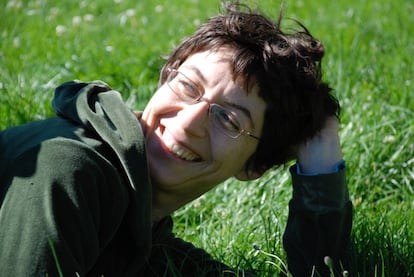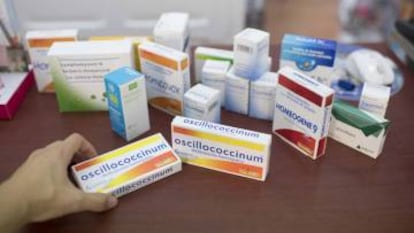Hundreds of Spanish scientists ask for action against pseudoscience “that kills”
More than 400 people have signed an open letter triggered by the case of a cancer patient who died after refusing regular medical treatment

“We all learn from our mistakes,” said Rosa Morillo to her oncologist a few weeks before dying.
When Rosa, an economist, noticed a lump in her breast in February 2014, she turned to practitioners of pseudoscience instead of seeking standard medical treatment. Soon later, her lump had quadrupled in size. Within a year the cancer had spread, and two years after that, Rosa passed away in circumstances so painful that her family would rather not discuss them. “If she’d been told and graphically shown what the end was going to be like, as they do with cigarette packets, perhaps everything would have been different,” says her sister.
This requires solutions in Spain, by enforcing the law, by creating new laws and by protecting the rights of patients and their families
Open letter to Health Ministry
In July 2014, a 21-year-old physics student named Mario Rodríguez died after abandoning his leukemia treatment for a vitamin-based therapy advocated by a healer. He died six months after getting started on the vitamins, but before passing away Mario told his father Julián,“Dad, I made a mistake.” His father filed a criminal complaint against the “expert in natural and orthomolecular medicine” who treated Mario, and an appellate court in Valencia ruled in February 2016 that this pseudo-doctor should be prosecuted for pretending to be able to cure cancer with his recommendations.
Rosa and Mario did not get a second chance, but Spanish society may still be in time to learn from its own mistakes. “We are sharing Rosa’s story in the hope that it will help avoid other unnecessary deaths,” said her sister, who did not wish to see her name in print. “If homeopathy does not cure cancer, physicians who work as homeopathic doctors should be under greater oversight from the authorities.”
Medical associations have received reports of other cases of people who have died in similar circumstances after refusing regular medical treatment. The cases include families from all walks of life, with very different backgrounds and living in various parts of Spain. But there are some recurring themes, and one of them is the patients’ use of homeopathy.
Now, a group of 400 people who work in the fields of science and health have sent an open letter to Spanish Health Minister Luisa Carcedo demanding firmer action against pseudoscience.
“Let’s be clear: pseudoscience kills,” begins the letter. The initiative was born as a response to Rosa’s case, which was made public by EL PAÍS’s science section, Materia. “In some cases, like Mario Rodríguez’s, we are dealing with people who are not doctors but who work with impunity at centers that violate health center legislation. In other cases, like Rosa’s, they are licensed practitioners whose actions are known to medical associations; the latter allow these practitioners to keep misleading seriously ill patients, leading to deception in the best of cases and to death in the worst,” reads the document, which is being sponsored by several scientific and patient associations, including the Association to Protect Patients from Pseudoscientific Therapies (APETP), the Spanish Group of Cancer Patients, and the ARP-Society for the Advancement of Critical Thought.

The latest survey by the Foundation for Science and Technology (Fecyt) shows that half of Spaniards believe homeopathy works at least “somewhat.” The fact that these products are sometimes prescribed by doctors, sold at pharmacies and considered “medicinal products” by the authorities go some way towards this belief.
Meanwhile, the Spanish government has alerted Brussels to the fact that “there have been deaths of cancer patients who abandoned scientifically-proven treatments in favor of homeopathic products,” according to a Health Ministry report that EL PAÍS has seen. Spain has told the EU that current regulations “pose a health risk.”
“Minister, this problem cannot just be solved in Europe, as you recently suggested, because it goes beyond homeopathy. This also requires solutions in Spain, by enforcing the law, by creating new laws and by protecting the rights of patients and their families. This is resolved by fighting something that is becoming a plague affecting the roots of our country’s health system,” reads the open letter.
Signatories demand action against licensed physicians “who infringe the medical ethical code with the consent of their respective medical associations, which are letting them offer pseudotherapies.” The letter also wants authorities to move against “non-professionals who publicly, evidently and notoriously infringe health center legislation.” A third request involves new legislation or oversight to prevent the sale of homeopathic products in Spanish pharmacies.
A three-year agony
Rosa Morillo’s personal tragedy began in February 2014, at the age of 41, when she found a one-centimeter lump in one of her breasts. Doctors recommended analyzing the lump, but Rosa decided to seek a second opinion. An economist with a brilliant resume who could speak four languages, Rosa had been interested in pseudotherapies “all her life,” and had even trained to administer them.
Her bills show that in February 2014 she went to see a licensed gynecologist who recommended nothing more than a homeopathy treatment. The tumor grew rapidly throughout the following months, and Rosa realized that she had made a mistake. “Listening to her is going to cost me a breast,” she told her family.

Rosa underwent surgery to extract the tumor, but she refused chemotherapy, preferring alternative treatments against the recommendations of her doctors at La Paz Hospital in Madrid. “The disease had affected her reasoning ability,” said her sister. A year later, the cancer had spread to her skin, bones and marrow.
Her hospital doctors noted that Rosa had started seeing a homeopathic oncologist named Dr Martí Bosch. She had heard about him in a magazine called Discovery DSalud, which advocates all kinds of alternative treatments. In an article, Bosch recommended treating cancer through diet, vitamin supplements and sea salt baths. She made an appointment to see him, and between August and November 2016 Bosch gave her seven homeopathy prescriptions, six phytotherapy (herbal) products and five orthomolecular supplements (vitamins). He also prescribed “hydrotherapy” (hot saltwater baths) and treatment with dietary minerals.
Then came “miraculous blood tests showing an alleged increase in her red blood cell count,” says Rosa’s sister. Rosa was jubilant. A month later, doctors at La Paz confirmed that her cancer had in fact spread some more, and they again recommended chemotherapy. Again, Rosa refused. By the spring of 2017, however, her health had deteriorated to such a degree that she finally accepted radiotherapy. She died in May.
Her family reported the case to an association that represents doctors, Organización Médica Colegial, which has launched a Pseudoscience Observatory to keep track of similar cases in Spain. A doctor in the Basque city of Vitoria reported seeing a woman whose left breast was completely taken up by a tumor after following homeopathy treatments for two years. And in Girona, a hospital oncologist reported treating a woman with a “completely putrid” breast who had only followed pseudoscientific treatments and who died soon later.
English version by Susana Urra.
Tu suscripción se está usando en otro dispositivo
¿Quieres añadir otro usuario a tu suscripción?
Si continúas leyendo en este dispositivo, no se podrá leer en el otro.
FlechaTu suscripción se está usando en otro dispositivo y solo puedes acceder a EL PAÍS desde un dispositivo a la vez.
Si quieres compartir tu cuenta, cambia tu suscripción a la modalidad Premium, así podrás añadir otro usuario. Cada uno accederá con su propia cuenta de email, lo que os permitirá personalizar vuestra experiencia en EL PAÍS.
¿Tienes una suscripción de empresa? Accede aquí para contratar más cuentas.
En el caso de no saber quién está usando tu cuenta, te recomendamos cambiar tu contraseña aquí.
Si decides continuar compartiendo tu cuenta, este mensaje se mostrará en tu dispositivo y en el de la otra persona que está usando tu cuenta de forma indefinida, afectando a tu experiencia de lectura. Puedes consultar aquí los términos y condiciones de la suscripción digital.








































